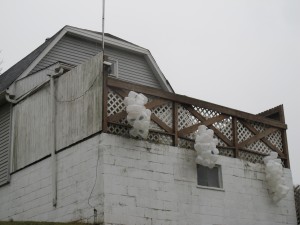PA DEP does not keep public records of all drilling complaints

Susan Phillips / StateImpact Pennsylvania
Empty water jugs used to haul clean water hang from a house in Washington County. Residents suspected nearby gas drilling as the culprit. The DEP investigation concluded drilling was not to blame.
Documents from the ongoing court battle over the constitutionality of Pennsylvania’s oil and gas law have revealed that the state Department of Environmental Protection does not always keep public records of pollution complaints related to natural gas drilling, the Pittsburgh Post-Gazette reports.
One of the key questions that remain about the law, known as Act 13, is whether it is a “special law” crafted for the oil and gas industry. Act 13 requires the DEP to notify public water suppliers about pollution incidents, but not private well owners. Attorneys for the municipalities that challenged the law argue that makes an “unconstitutional distinction” between public and private drinking water supplies, according to briefs filed with the Commonwealth Court on Tuesday. To read the briefs, please see the end of this story.
More from the Post-Gazette:
Among its 16 attached exhibits, the brief included 12 pages of sworn deposition testimony by Alan Eichler, DEP oil and gas program manager, who said the department “didn’t typically issue Notices of Violation,” or assess fines or issued determination letters when water contamination complaints were privately settled. And as a result the public has no way to know if, when or where private water supplies might be contaminated or at risk of contamination.
The brief used the deposition testimony to illustrate that private water supply users faced health risks without a legal requirement that DEP notify private water supply users of contamination affecting their water supplies. More than 3 million Pennsylvania residents rely on private well water for drinking and everyday use, according U.S. Census Bureau statistics cited in the brief.
Mr. Eichler was asked, during his deposition Jan. 29 for a water contamination case involving Range Resources’ Yeager drilling operation in Amwell, if an individual could find out if his neighbor’s well water had been contaminated if his neighbor and the shale gas drilling company had settled the complaint.
According to the deposition transcript from that case, now before the state Environmental Hearing Board, Mr. Eichler said, “Well … no, when I think about what information we have on file and what (the plaintiff neighbor) would have access to it’s not clear to me how he might become aware of a problem at the Yeager water supply.”
The DEP responded to the Post-Gazette’s inquiry with 64 “clarifications and corrections” to Eichler’s testimony in a document signed by Eichler and dated March 14. Eichler now says the settlement agreement and documents levying fines against Range Resources in the Yeager case is available in a public permit file.
The DEP told the Post-Gazette that records related to non-criminal investigations do not have to be made public:
“Non-criminal investigative records are not required to be produced to the public even upon conclusion of an investigation, according to the (state) Right to Know Law,” Morgan Wagner, a DEP spokeswoman wrote in an email response. “Once it is an investigative record, it is always an investigative record.”
According to the DEP, there have been 98 private water supplies contaminated by shale gas drilling in Pennsylvania from 2008 through 2013.
This is not the first time the DEP’s record-keeping has been called into question. In a 2012 open records case, the Commonwealth Court criticized the DEP for is poor record-keeping and forced the agency to turn over documents related to water contamination to the Scranton Times-Tribune.
To read the briefs, please click on the following links:
Part one of the challengers’ brief is available by clicking here. Part two, including Eichler’s testimony on page 102, is available by clicking here.
The DEP’s brief is available by clicking here.
















